[Complete Guide] High ISO vs Low ISO and Their Difference
It takes hours of analysis and assessment to know whether you should use high-ISO vs low-ISO photos. ISO is nothing but the exposure triangle alongside the aperture and shutter speed. These elements' balance will show whether the photo you've clicked is properly exposed.
So, to help you to not get confused while taking the photo of which photo ISO you should be selecting, this article aims to show all the credentials of high ISO vs low ISO.
Let's dive into it.
1. The Secret for Lower ISO vs High ISO
They have different meanings when you talk about high ISO vs low ISO. A higher ISO value, including ISO 3200, 1600, 800, or higher, implies that the film or camera sensor is light-sensitive.
On the other hand, a low ISO, including ISO 200,100 or 50, means that the sensor carries a low light sensitivity. You can use a high ISO in low light to acquire the properly exposed image, allowing you to use a faster shutter speed and narrower lens aperture.

However, High ISO might become the culprit behind causing the grains in film cameras and noise in different digital cameras, causing the loss of sharpness and low image quality.
After being used in bright light, a low ISO doesn't expose your photo to the light to a great extent. The good thing is that despite using the slower shutter speed or wide aperture, the result of the photo will remain the same.
Since low ISO comes up with the least noise, it will eventually help you to create high-quality images. When keeping the aperture and shutter speed and varying the ISO, your photo will get brighter when you increase the ISO. The same effect is also possible by opening the lens aperture and slowing down your shutter speed.
As you march into the later stages of this guide, the debate of lower ISO vs high ISO becomes even more exciting.
So don't lose your focus and keep on reading it.
2. Low ISO vs High ISO Comparsions
Talking about the different high-ISO and low-ISO pictures might help you know how much brightness will be increased when you increase the ISO. You'll also learn about the amount of noise caused by increasing the ISO.
ISO 100 vs 200
Both ISO 200 and 100 belong to low ISO settings but significantly differ. The difference will become even more evident when looking at the 100 crops of the photos. With the ISO 200, you can enjoy the brightness's one extra stop than ISO, but it also frustrates you with the extra noise.
The extra brightness of the photo is evident in the picture mentioned below.
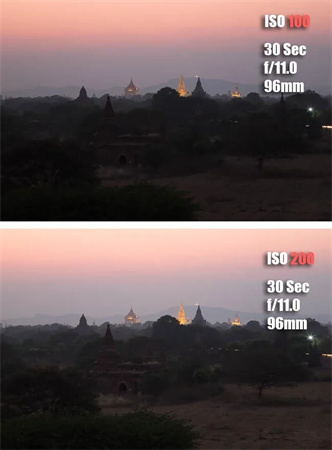
When you look at the 200% crop, you'll learn about the increase in the extra shadow detail brought by the shooting at ISO 200. However, this scenario also triggers a small degree of noise, and you can notice that noise in the trees.
ISO 200 vs 400
Whenever the debate about high ISO vs low ISO comes into the table, you can't ignore the ISO 200 vs 400 discussions.
With ISO 200 being considered low ISO, you can assume ISO 40 to be in the middle between high and low. If you're shooting the photos at ISO 400, you'll eventually get one extra stop of brightness over 200.
As we discussed above that increasing the ISO also means the noise in the photo will also be increased dramatically
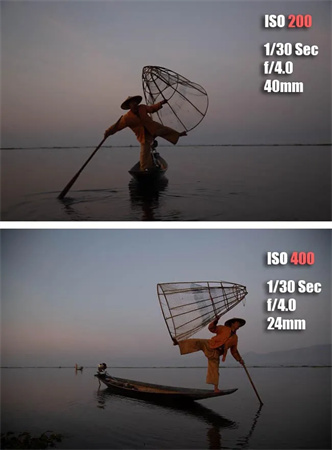
ISO 640 to ISO 16000 and Above
When you reach out to the ISO 640, it indicates getting the high ISO photos. If you love low-light photography, ISO 640 will be ideal for you as it helps you to shoot the details in clear shadows without causing the noise.
The comparison of photos when you increase the ISO is shown in the image below.
You can notice that the noise has increased dramatically in the dunes until you obscure all detail at ISO 16000.
Since ISO 640 is less exposed to light when compared with ISO 16000 or 4000, you can get a slower shutter speed, creating star trails with stars frozen in the high ISO. This shows the importance of increasing the ISO and perfectly concludes the low ISO vs high ISO debate.
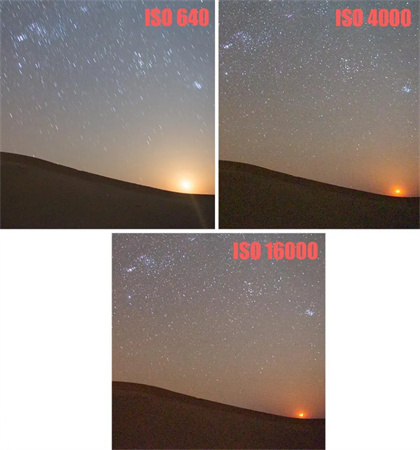
3. How to Improve Your High-ISO Picture Easily and Fast?
If, after reading this high ISO vs low ISO photos debate, you've clicked the photos in the higher ISO and intend to improve the further quality of photos, HitPaw Photo Enhancer is there to help you.
It is a remarkable AI-based photo enhancer that empowers you to enhance the quality of photos by removing the noise of photos without putting them in the hard yards. HitPaw Photo Enhancer offers four outstanding AI models that stimulate making the higher ISO photos look a joy to watch.
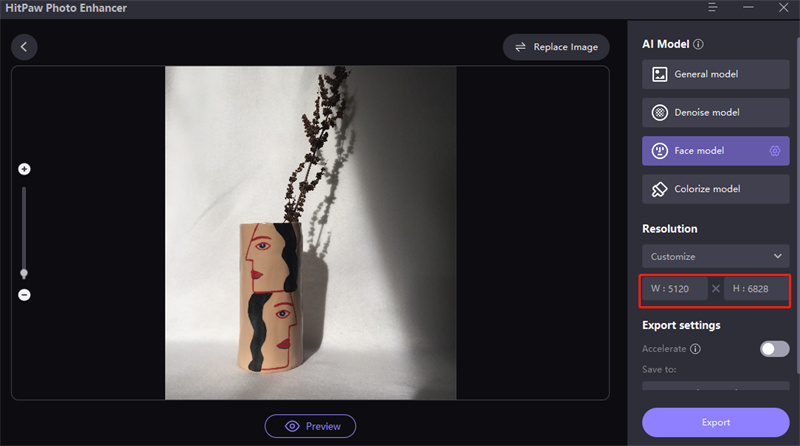
- The user interface of HitPaw Screen Recorder is simple to use.
- Its most notable feature is that you can modify the pip position and size
- The user interface of HitPaw Screen Recorder is simple to use.
- Its most notable feature is that you can modify the pip position and size
4. Is Higher or Lower ISO Better?
You've reviewed the ISO high vs low debate in this post, so what did you make of it? Which one is better, high ISO or low ISO?
A lower ISO means you get less noise and higher image quality photos. However, you must expose these photos by choosing the appropriate shutter speed and aperture to make it happen.
Despite getting the widest aperture or the slowest shutter speed, you'll need to select the higher ISO for better image results if your photo is dark. But a higher ISO might bring in the extra noise.
If you intend to get more significant detail, you click the photo at a higher ISO courtesy of the image processing's quirk. However, shooting the photo at the lower ISO will raise the exposure in the light room, and camera RAW introduces more noise.
Conclusion
After learning about the high ISO vs low ISO discussion in this blog, you can go for an appropriate option.
We've recommended the HitPaw Photo Enhancer , which empowers you to improve the quality and easily reduce the noise of high ISO pictures.






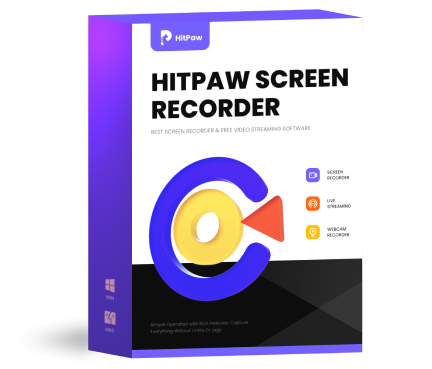




Home > Photo Tips > [Complete Guide] High ISO vs Low ISO and Their Difference
Select the product rating:
Joshua Hill
Editor-in-Chief
I have been working as a freelancer for more than five years. It always impresses me when I find new things and the latest knowledge. I think life is boundless but I know no bounds.
View all ArticlesLeave a Comment
Create your review for HitPaw articles